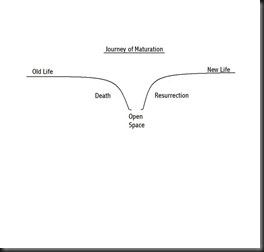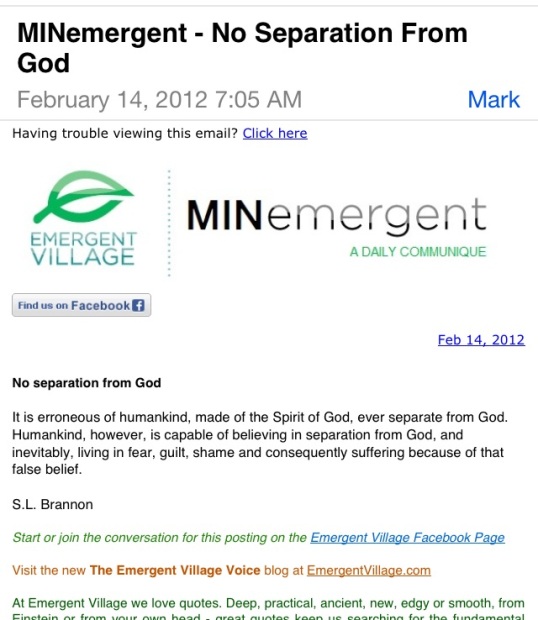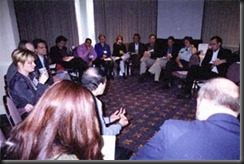Going Through the Open Space to a New Life
The Two Agreements is not only about my reinterpretation of the New Testament, or the state of the Emergent Conversation; it is also largely about my own spiritual journey. That is why I have written at length about the “open space”. The open space is a time when your old life is gone (either because it was “taken” or because you consciously shed it), but you have not yet arrived at your new life. This transformative period can be incredibly lonely, painful, and anxiety-ridden; however, it is also an opportunity to challenge old beliefs. The goal is to learn to trust the process. I have gone through several such periods, the longest being the five years when I slowly and agonizingly sloughed off my fundamentalist beliefs and eventually emerged in my new spiritual life.
Without a doubt, the most difficult aspect of an open space is how utterly isolated you feel. When you left your old life, you did not just lose places, things or jobs; you have left people behind as well. Perhaps you have lost your spouse through death or divorce; maybe your friends have stopped calling because they can’t or won’t understand what you are going through. You may have even been separated from your church community. The key to arriving on the other side of the open space is to realize that you are NEVER alone, for you are never disconnected from God. I have often heard in my ministry groups stories of people who, in their darkest hour, felt the presence of an “Unseen Hand”, a force that kept them rooted to their lives. For some, it materialized as love for their children; for others it was a mere whisper, promising better things to come. Then, others saw the new life of someone who “made it through” and got the hope of their own new life. In all cases, it was the life force manifested, and it most likely saved their lives.
It is also imperative for anyone finding himself or herself in an open space to connect with community. Unfortunately, this often easier said than done, especially for those facing mental health challenges. In my interfaith support groups, I have heard hundreds of stories, many from people who were rejected or ignored by their fellow church members. One woman literally ran to her church after an incident in her home had left her fearing for her emotional stability. She was without transportation, and she asked the women in the administrative office if one of them could drive her to a nearby mental health facility. Instead of helping her, the women backed away, as if she was a leper. One even asked if there weren’t services for “people like her”.
I heard another story, from a Deacon at a local church. Twenty years before, his wife had broken her leg. For days, his phone never stopped ringing, with callers offering prayers for a speedy recovery. They showed up at his door, bearing enough food for an army. The reaction was very different, however, when his daughter was hospitalized with a mental health issue. Imagine his sorrow when the phone rang not once; when no one showed up with food for his family.
Open spaces do not only apply to individuals; larger entities and organizations can also face transitional periods that threaten their very existence. An example that immediately comes to mind is the United States, with its uncertain economic future and political divisiveness. Christianity has also been at a stand-still for some time, and arguably, is regressing. People, particularly the young, have been leaving fundamentalist churches in droves. According to Tony Jones, author of The New Christians—Dispatches From the Emergent Frontier, millions of church-goers have left the church, never to return. Many of these folks were raised in the church; but now, disillusioned, they are walking away, not only from the church’s teachings, but, in some cases, belief in God. And, that is indeed a travesty.
Very simply, whether we are talking about an individual, a country, or a religious institution, the questions remain the same: “Now that all hell has broken loose, what are you/we going to do about it?” – for your old life died, gone and never to return. And, something needs to be done. Then, the follow up question is, “How much do you/we love yourself/ourselves?”— for the spiritual lesson is to love one’s self enough “resurrect” a new life. Only a genuine love will do.
The answer is also the same; whether we are talking about a person who is facing an open space in regards to their faith, or the religious organization itself, facing the defection of its flock, we must remember that we are never alone. Christ left the Holy Spirit to guide us across every open space as we grow from one new life into the next.
For those of you in the area, on February 24 and 25 I am speaking at the 2012 MULTICULTURAL ALL IN THE FAMILY SUMMIT, hosted by NAMI Tennessee. For more information, contact Kelly Dorsey at 731-444-0040 or kelly.dorsey@att.net . All are welcome!



